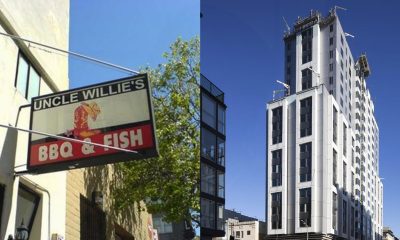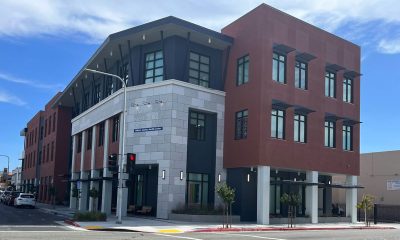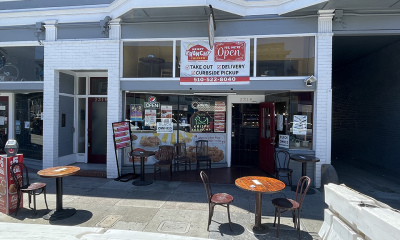Health
THE RELIGION CORNER: MSG Foods — What You Really Need To Know (Pt. 1)
By Lyndia Grant
Special to the NNPA from The Washington Informer
Each year in memory of my mother, Fannie Estelle Hill Grant, and to honor the anniversary of my radio talk show The Lyndia Grant Show, I sponsor a health fair. The next show will air on Radio One’s WYCB AM, Spirit 1340, Saturday, June 13, 2015. This year’s health fair will be held at The Mill, 1500 Union Avenue, Baltimore, Maryland. I’m so pleased to have invited the honorable Mayor Stephanie Rawlings-Blake and the president of the Baltimore City Council, Bernard “Jack” Young. District 7 is where The Mill is situated, and The Honorable Nick Mosby & Helen Holton will welcome attendees to his District.
This health fair has been in the planning phase for more than six months, long before the riots! Followers of my column know health fairs are held in memory of mother who died from complications of Type 2 Diabetes at my anniversary, every year; which ties into the reason for this column.
Recently, I wrote a column titled Balancing Your Life — Mentally, Physically and Spiritually. I spoke of how sickness is all over the land, partially because of MSG foods, and I shared a true story about MSG, and how it causes weight gain and its direct connection to Type 2 Diabetes. A reader called me, which prompted this follow-up column. The caller said “You did not tell us what MSG means.” I took for granted most readers were familiar with MSG, obviously not. This follow-up is for those of you who may not be familiar with this acronym.
What is monosodium glutamate (MSG)? It is a sodium salt food additive used to provide flavor to Chinese food, canned vegetables, soups and processed meats.
An article published by the Mayo Clinic shares information from The Food and Drug Administration (FDA), which classified MSG as a food ingredient that’s “generally recognized as safe,” but its use remains controversial. For this reason, when MSG is added to food, the FDA requires that it be listed on the label.
A study by National Institute of Health (NIH) showed that mice injected with monosodium glutamate (MSG) led to the development of significant inflammation, central obesity, and type 2 diabetes. By 6 and 12 months of age, “These results take on considerable significance in light of the widespread usage of dietary MSG and we suggest that MSG should have its safety profile re-examined and be potentially withdrawn from the food chain,” the report said.
I’m sure you’re asking: What foods contain MSG? Let us examine the answer. Many websites share comprehensive lists of MSG foods. Www.msgtruths.org has a small sampling for those of you who would like to avoid MSG foods. They suggest you not eat: Doritos; KFC, chicken and sausage products, ranch dressing, parmesan items, gravy, dipping sauces, and fries with any kind of seasoning on them except plain salt. Flavored salty snack chips, like Cheetos and items with cheese powder added. Avoid parmesan encrusted soups, Caesar salad, fish sauce or extract, soy sauce, boars head, cold cuts and beef jerky (usually made with soy sauce) and anything that comes out of a can; the list is extremely long, folks.
Look around and pay close attention to body sizes today. Then look in your yearbooks from the 1950’s, 1960’s and even 1970’s; young people were much smaller.
Organic foods are best, more expensive, but you only have one life. I’m worth it; are you? Far too many African Americans are unaware. This appears to be another form of enslavement; it is a way to kill us off quickly! More next week.
Lyndia Grant is an author, inspirational and motivational speaker, radio talk show host and columnist. Visit her new website at www.lyndiagrant.com and call 202-263-4621. Listen Fridays at 6 p.m. to her talk show on WYCB (1340 AM), a Radio One station.
Activism
Oak Temple Hill Hosts Interfaith Leaders from Across the Bay Area
Distinguished faith leaders Rev. Ken Chambers, executive director the Interfaith Council of Alameda County (ICAC); Michael Pappas, executive director of the San Francisco Interfaith Council; and Dr. Ejaz Naqzi, president of the Contra Costa County Interfaith Council addressed the group on key issues including homelessness, food insecurity, immigration, and meaningful opportunities to care for individuals and communities in need.

Special to the Post
Interfaith leaders from the Bay Area participated in a panel discussion at the annual meeting of communication leaders from The Church of Jesus Christ of Latter-day Saints held on Temple Hill in Oakland on May 31. Distinguished faith leaders Rev. Ken Chambers, executive director the Interfaith Council of Alameda County (ICAC); Michael Pappas, executive director of the San Francisco Interfaith Council; and Dr. Ejaz Naqzi, president of the Contra Costa County Interfaith Council addressed the group on key issues including homelessness, food insecurity, immigration, and meaningful opportunities to care for individuals and communities in need.
Chambers, said he is thankful for the leadership and support of the Church of Jesus Christ Latter-Day Saints’ global ministry, which recently worked with the interfaith congregations of ICAC to help Yasjmine Oeveraas a homeless Norwegian mother and her family find shelter and access to government services.
Oeveraas told the story of how she was assisted by ICAC to the Oakland Post. “I’m a Norwegian citizen who escaped an abusive marriage with nowhere to go. We’ve been homeless in Florida since January 2024. Recently, we came to California for my son’s passport, but my plan to drive for Uber fell through, leaving us homeless again. Through 2-1-1, I was connected to Rev. Ken Chambers, pastor of the West Side Missionary Baptist Church and president of the Interfaith Council of Alameda County, and his car park program, which changed our lives. We spent about a week-and-a-half living in our car before being blessed with a trailer. After four years of uncertainty and 18 months of homelessness, this program has given us stability and hope again.
“Now, both my son and I have the opportunity to continue our education. I’m pursuing cyber analytics, something I couldn’t do while living in the car. My son can also complete his education, which is a huge relief. This program has given us the space to focus and regain our dignity. I am working harder than ever to reach my goals and give back to others in need.”
Richard Kopf, communication director for The Church of Jesus Christ in the Bay Area stated: “As followers of Jesus Christ, we embrace interfaith cooperation and are united in our efforts to show God’s love for all of his children.”
Activism
“Unnecessary Danger”: Gov. Newsom Blasts Rollback of Emergency Abortion Care Protections
Effective May 29, CMS rescinded guidance that had reinforced the obligation of hospitals to provide abortion services under the Emergency Medical Treatment and Labor Act (EMTALA) when necessary to stabilize a patient’s condition. Newsom warned that the rollback will leave patients vulnerable in states with strict or total abortion bans.

By Bo Tefu, California Black Media
Gov. Gavin Newsom is criticizing the Centers for Medicare & Medicaid Services (CMS) for rolling back federal protections for emergency abortion care, calling the move an “unnecessary danger” to the lives of pregnant patients in crisis.
Effective May 29, CMS rescinded guidance that had reinforced the obligation of hospitals to provide abortion services under the Emergency Medical Treatment and Labor Act (EMTALA) when necessary to stabilize a patient’s condition.
Newsom warned that the rollback will leave patients vulnerable in states with strict or total abortion bans.
“Today’s decision will endanger lives and lead to emergency room deaths, full stop,” Newsom said in a statement. “Doctors must be empowered to save the lives of their patients, not hem and haw over political red lines when the clock is ticking. In California, we will always protect the right of physicians to do what’s best for their patients and for women to make the reproductive decisions that are best for their families.”
The CMS guidance originally followed the 2022 Dobbs decision, asserting that federal law could preempt state abortion bans in emergency care settings. However, legal challenges from anti-abortion states created uncertainty, and the Trump administration’s dismissal of a key lawsuit against Idaho in March removed federal enforcement in those states.
While the rollback does not change California law, Newsom said it could discourage hospitals and physicians in other states from providing emergency care. States like Idaho, Mississippi, and Oklahoma do not allow abortion as a stabilizing treatment unless a patient’s life is already at risk.
California has taken several steps to expand reproductive protections, including the launch of Abortion.CA.Gov and leadership in the Reproductive Freedom Alliance, a coalition of 23 governors supporting access to abortion care.
Activism
OPINION: Your Voice and Vote Impact the Quality of Your Health Care
One of the most dangerous developments we’re seeing now? Deep federal cuts are being proposed to Medicaid, the life-saving health insurance program that covers nearly 80 million lower-income individuals nationwide. That is approximately 15 million Californians and about 1 million of the state’s nearly 3 million Black Californians who are at risk of losing their healthcare.

By Rhonda M. Smith, Special to California Black Media Partners
Shortly after last year’s election, I hopped into a Lyft and struck up a conversation with the driver. As we talked, the topic inevitably turned to politics. He confidently told me that he didn’t vote — not because he supported Donald Trump, but because he didn’t like Kamala Harris’ résumé. When I asked what exactly he didn’t like, he couldn’t specifically articulate his dislike or point to anything specific. In his words, he “just didn’t like her résumé.”
That moment really hit hard for me. As a Black woman, I’ve lived through enough election cycles to recognize how often uncertainty, misinformation, or political apathy keep people from voting, especially Black voters whose voices are historically left out of the conversation and whose health, economic security, and opportunities are directly impacted by the individual elected to office, and the legislative branches and political parties that push forth their agenda.
That conversation with the Lyft driver reflects a troubling surge in fear-driven politics across our country. We’ve seen White House executive orders gut federal programs meant to help our most vulnerable populations and policies that systematically exclude or harm Black and underserved communities.
One of the most dangerous developments we’re seeing now? Deep federal cuts are being proposed to Medicaid, the life-saving health insurance program that covers nearly 80 million lower-income individuals nationwide. That is approximately 15 million Californians and about 1 million of the state’s nearly 3 million Black Californians who are at risk of losing their healthcare.
Medicaid, called Medi-Cal in California, doesn’t just cover care. It protects individuals and families from medical debt, keeps rural hospitals open, creates jobs, and helps our communities thrive. Simply put; Medicaid is a lifeline for 1 in 5 Black Americans. For many, it’s the only thing standing between them and a medical emergency they can’t afford, especially with the skyrocketing costs of health care. The proposed cuts mean up to 7.2 million Black Americans could lose their healthcare coverage, making it harder for them to receive timely, life-saving care. Cuts to Medicaid would also result in fewer prenatal visits, delayed cancer screenings, unfilled prescriptions, and closures of community clinics. When healthcare is inaccessible or unaffordable, it doesn’t just harm individuals, it weakens entire communities and widens inequities.
The reality is Black Americans already face disproportionately higher rates of poorer health outcomes. Our life expectancy is nearly five years shorter in comparison to White Americans. Black pregnant people are 3.6 times more likely to die during pregnancy or postpartum than their white counterparts.
These policies don’t happen in a vacuum. They are determined by who holds power and who shows up to vote. Showing up amplifies our voices. Taking action and exercising our right to vote is how we express our power.
I urge you to start today. Call your representatives, on both sides of the aisle, and demand they protect Medicaid (Medi-Cal), the Affordable Care Act (Covered CA), and access to food assistance programs, maternal health resources, mental health services, and protect our basic freedoms and human rights. Stay informed, talk to your neighbors and register to vote.
About the Author
Rhonda M. Smith is the Executive Director of the California Black Health Network, a statewide nonprofit dedicated to advancing health equity for all Black Californians.
-

 Activism4 weeks ago
Activism4 weeks agoAfter Two Decades, Oakland Unified Will Finally Regain Local Control
-

 Alameda County4 weeks ago
Alameda County4 weeks agoOakland Begins Month-Long Closure on Largest Homeless Encampment
-

 Activism4 weeks ago
Activism4 weeks agoNew Oakland Moving Forward
-

 Barbara Lee4 weeks ago
Barbara Lee4 weeks agoWNBA’s Golden State Valkyries Kick Off Season with Community Programs in Oakland
-

 Activism4 weeks ago
Activism4 weeks agoEast Bay Community Foundation’s New Grants Give Oakland’s Small Businesses a Boost
-

 Activism4 weeks ago
Activism4 weeks agoOakland Hosts Town Hall Addressing Lead Hazards in City Housing
-

 Activism4 weeks ago
Activism4 weeks agoOPINION: Your Voice and Vote Impact the Quality of Your Health Care
-

 Bo Tefu4 weeks ago
Bo Tefu4 weeks agoGov. Newsom Highlights Record-Breaking Tourism Revenue, Warns of Economic Threats from Federal Policies
























































